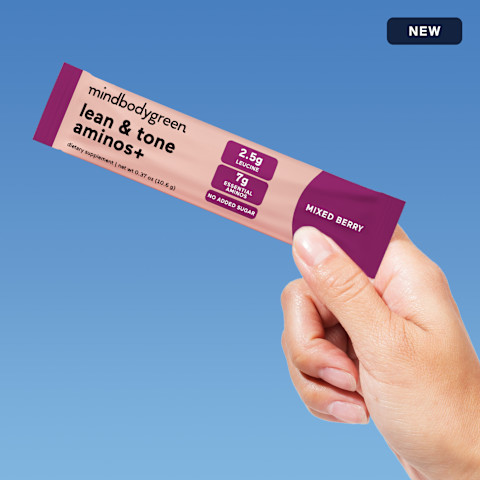Protein vs. Amino Acid Supplements: Here’s The Difference & When To Take Each

For the last two years, we’ve seen multiple supplements that were once only found in bodybuilders’ shaker cups make their way into mainstream use. First, it was protein powders, as everyone realized they would benefit from a protein boost. Next was creatine, as people realized this highly researched supplement delivers fitness, recovery, and cognitive benefits to all.* Now, it’s all about amino acids.
Amino acids, especially essential amino acids, are key ingredients in actually fueling muscle protein synthesis (MPS)—the body’s processes for building and repairing muscle. In fact, the amino acid leucine is the main dietary trigger of the process.*
So if you're concerned with building muscle, improving metabolic health, and promoting longevity, amino acids should be on your radar.*
But you may be wondering how an amino acid supplement differs from protein? Let’s break down the differences and why both of these classic gym bro supplements deserve a spot in your routine.
Protein vs. amino acids
Protein is one of the three macronutrients (alongside carbohydrates and fat) found in food that your body relies on every day. Eating enough protein has been top-of-mind for folks wanting to build muscle, lose fat, and feel more satisfied with their meals.
While protein is what we eat, amino acids are what the body is actually able to use. You see, the protein is made up of long chains of smaller compounds called amino acids. They are often referred to as the “building blocks” of muscle and nearly every tissue in the body.
During digestion, the body breaks apart protein into amino acids, which are then used to create hormones, enzymes, immune cells, and even neurotransmitters. And, of course, generate muscle tissue.
What protein supplements provide
Protein supplements are ultimately derived from food sources. For example, whey protein comes from milk, while plant-based protein powders are made from peas, rice, or other legumes and grains.
These powders count towards your daily protein goal and provide amino acids naturally found in that food. But not all protein powders are created equal.
Let’s take a closer look at whey. Whey protein isolate is fast-digesting and highly bioavailable, meaning it efficiently delivers all nine essential amino acids (EAAs) to the muscles to jumpstart recovery and growth. Whey is also naturally rich in branched-chain amino acids (BCAAs)—leucine, isoleucine, and valine—the trio that plays a critical role in muscle protein synthesis.*
And whey supplements likely naturally supply the minimum amount of leucine required to trigger MPS per serving, which is about 2.5 grams. A high-quality whey protein is widely considered the “gold standard of protein powders. This is our favorite clean, whey protein isolate powder.
Most plant proteins are incomplete, meaning they lack one or more of the nine EAAs your body can’t make on its own. Even when different plant sources are blended to create a complete profile, they’re typically lower in leucine, making them less efficient for building muscle compared to whey.*
Another concern that’s come to light in recent years is heavy metal contamination. Because many plants (especially rice, peas, and hemp) naturally absorb minerals from the soil, plant-based protein powders often have considerably higher levels of lead and other heavy metals compared to whey-based products.
What amino acid supplements provide
Amino acid supplements take things one step further by offering pure, free amino acids. These amino acids are absorbed quickly into the bloodstream.
This makes amino acids especially useful before, during, or right after workouts, when your body needs fast support for recovery and energy.* They can also be helpful between meals if you’re going long periods without eating (like while traveling).
But many amino acid supplements fall short, by either skipping certain EAAs altogether or by not providing enough leucine.
mindbodygreen’s lean & tone aminos+ was formulated to fill that gap. It delivers a complete spectrum of EAAs and BCAAs—at clinically effective doses, including the optimal amount of leucine—so you can truly support lean muscle development and recovery.*
Unlike many amino products that rely on proprietary blends, lean & tone aminos+ lists every amino acid and its precise dose on the label, so you know exactly what you’re getting.
When to take both
The truth is, you don’t have to choose between protein and amino acids. Both can fit into your daily routine, as they serve different, complementary purposes.
Think of protein powder as a way to help meet your daily protein needs and support long-term muscle and metabolic health.
Then, think of amino acids as more targeted support for performance, recovery, and
—nutrients that can help fill gaps between meals, sustain energy, and keep your body in a muscle-preserving, repair-focused state all day long.*
- Protein: Ideal for meals, post-workout shakes, or anytime you need a satisfying, nutrient-dense boost.
- Amino acids: Perfect before, during, or after workouts (or anytime you want to support energy, focus, recovery, or muscle maintenance between meals.)*
Used together, they ensure your body has a consistent source of amino acids needed to stay strong, resilient, and thriving.*
The takeaway
While protein and amino acid supplements may have started out as gym staples, they’ve earned their place in everyday wellness routines.
And if supporting your muscle health is on your mind (as it should be since muscle mass is the organ of longevity), then it’s time to fuel up with the right amino acids.*

